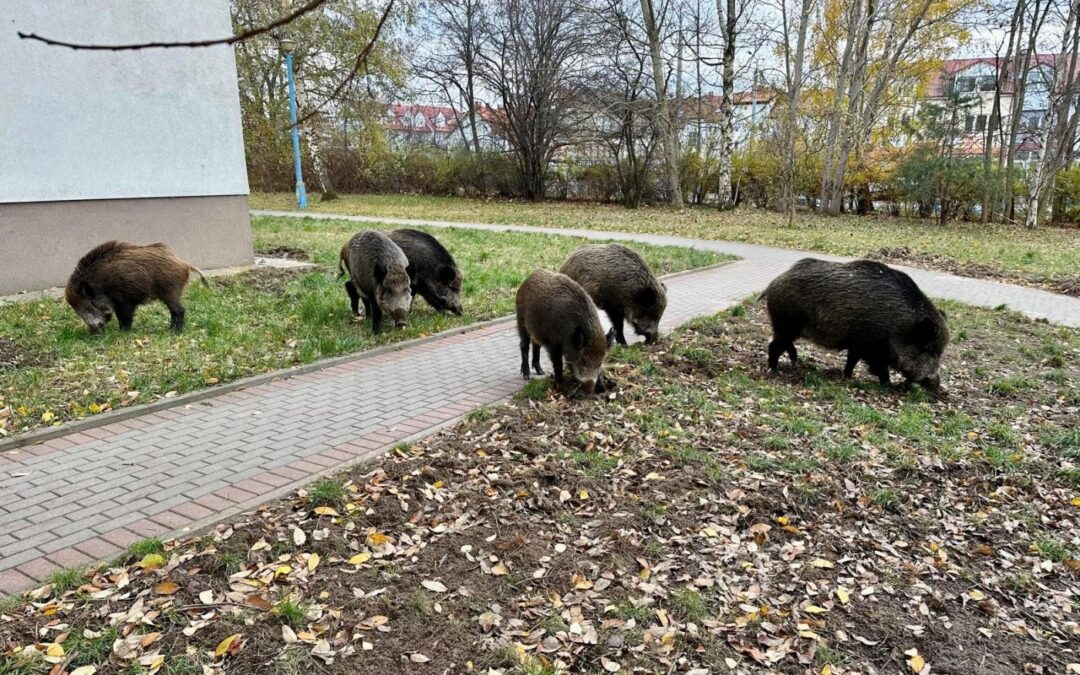Keep our news free from ads and paywalls by making a donation to support our work!

Notes from Poland is run by a small editorial team and is published by an independent, non-profit foundation that is funded through donations from our readers. We cannot do what we do without your support.
The Polish city of Gdynia has found an unlikely ally in its ongoing battle with wild boars: flowers.
Fragrant flowers such as hyacinths, favoured by residents for their vivid colours and sweet scent, appear to repel wild boars due to their intense scent and other deterrent properties.
According to local authorities, the number of reported sightings of the animals in the city centre has dropped significantly since they introduced the strategic planting of such flowers.
Located on Poland’s Baltic coast, Gdynia has extensive forests and parks, with around 45% of the city covered by green areas. It has struggled for years with a growing population of wild boars, which frequently emerge from the surrounding woodland into residential areas, digging up lawns and flowerbeds in search of food.
African Swine Fever (ASF), a highly contagious viral disease transmissible from wild boars to domestic pigs, has also been detected in some of Gdynia’s wild boar population.
In response to the outbreak, the district veterinarian last year ordered the trapping and culling of 80 wild boars. The move prompted protests from some residents, with the Let Them Live (Niech Żyją) foundation claiming it broke Poland’s animal protection laws.
To limit the animals’ presence in urban areas, Gdynia’s municipal gardening department has, over the past few years, implemented a non-lethal approach by introducing a range of plant species across locations frequented by wild boars.
“We have confirmed the effectiveness of this solution,” said Tadeusz Schenk, Gdynia’s municipal gardener, quoted by local station TVP3 Gdańsk. He explained that certain plants, such as those with a strong smell, that contain poisonous substances, or that impede movement, can have a deterrent effect on wild boars.
In addition to hyacinths, other plants such as ornamental garlic, lavender, knotweed, silvergrass, dense rose bushes, tufted hairgrass and catnip are being used to similar effect.
This is a final appeal for our emergency campaign to save Notes from Poland.
Next week, we may lose the major grant that sustains our work.
If you value the service we provide, please click below and make a donation to help it continue https://t.co/0gVkMlaA0W
— Notes from Poland 🇵🇱 (@notesfrompoland) April 22, 2025
According to the broadcaster, flowerbeds along the city’s central streets have shown noticeable improvement, remaining largely undisturbed by wild boars, sightings of which have also decreased.
“In March last year, we had more than 300 reports of wild boars; this March we recorded around 60 such reports from residents,” said Leonard Wawrzyniak of the Gdynia municipal police’s Ecopatrol, reported TVP3 Gdańsk.
According to data cited by regional news website Trójmiasto.pl, the city’s wild boar population dropped by 610 in 2024. Eighty were culled by trapping and killing, around 200 were culled via shooting, while the remainder includes seriously sick or injured animals euthanised by vets, as well as those who were already dead when found.
The growing wild boar population in urban areas has become a widespread issue in many Polish cities, with several looking for non-lethal solutions to the problem. Cities such as Warsaw and Kraków have urged residents to stop feeding the animals.
Other measures to discourage wild boars from entering urban areas include increasing their food sources and maintaining muddy bathing areas in nearby forests.
Despite these efforts, the problem has persisted, leading Warsaw’s mayor to authorise limited culling of wild boars. Other cities, including Poznań, have also previously approved culling to help control the spread of ASF.
Warsaw mayor @trzaskowski_ says that "with a very heavy heart" he has authorised the culling of wild boars in the city.
He says the decision was made to ensure safety, amid a record number of sightings of the animals this year https://t.co/Qb9ednhWPS
— Notes from Poland 🇵🇱 (@notesfrompoland) July 12, 2023

Notes from Poland is run by a small editorial team and published by an independent, non-profit foundation that is funded through donations from our readers. We cannot do what we do without your support.
Main image credit: Leonard Wawrzyniak/Straż Miejska w Gdyni

Alicja Ptak is deputy editor-in-chief of Notes from Poland and a multimedia journalist. She has written for Clean Energy Wire and The Times, and she hosts her own podcast, The Warsaw Wire, on Poland’s economy and energy sector. She previously worked for Reuters.



















